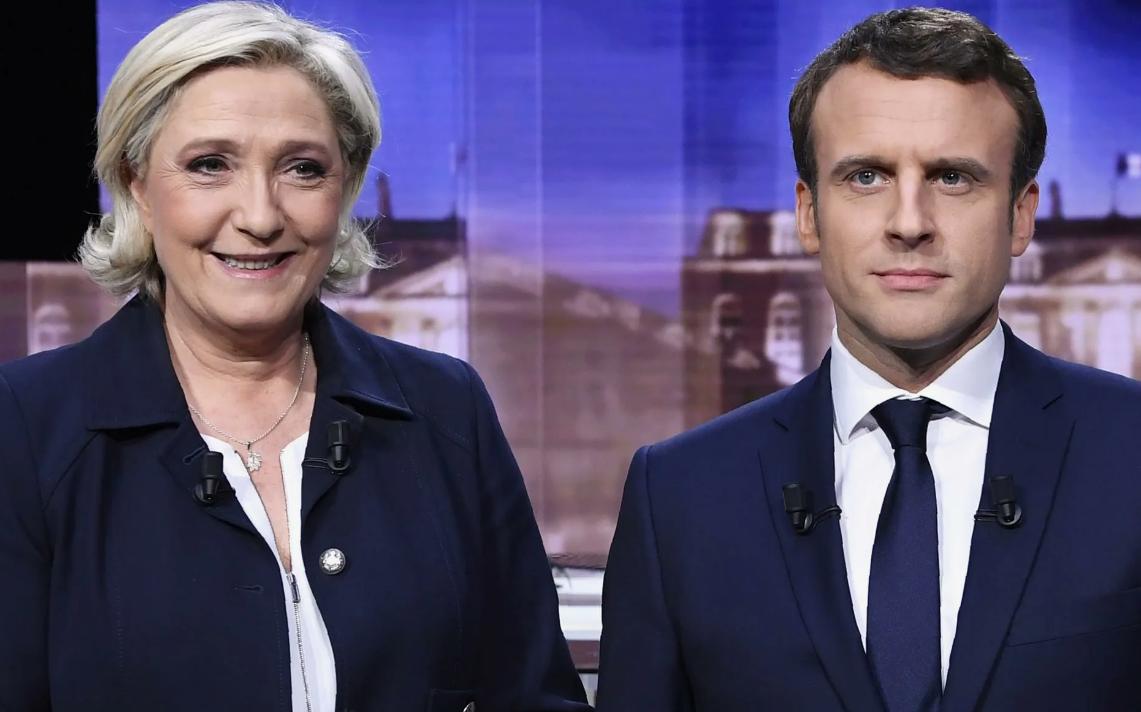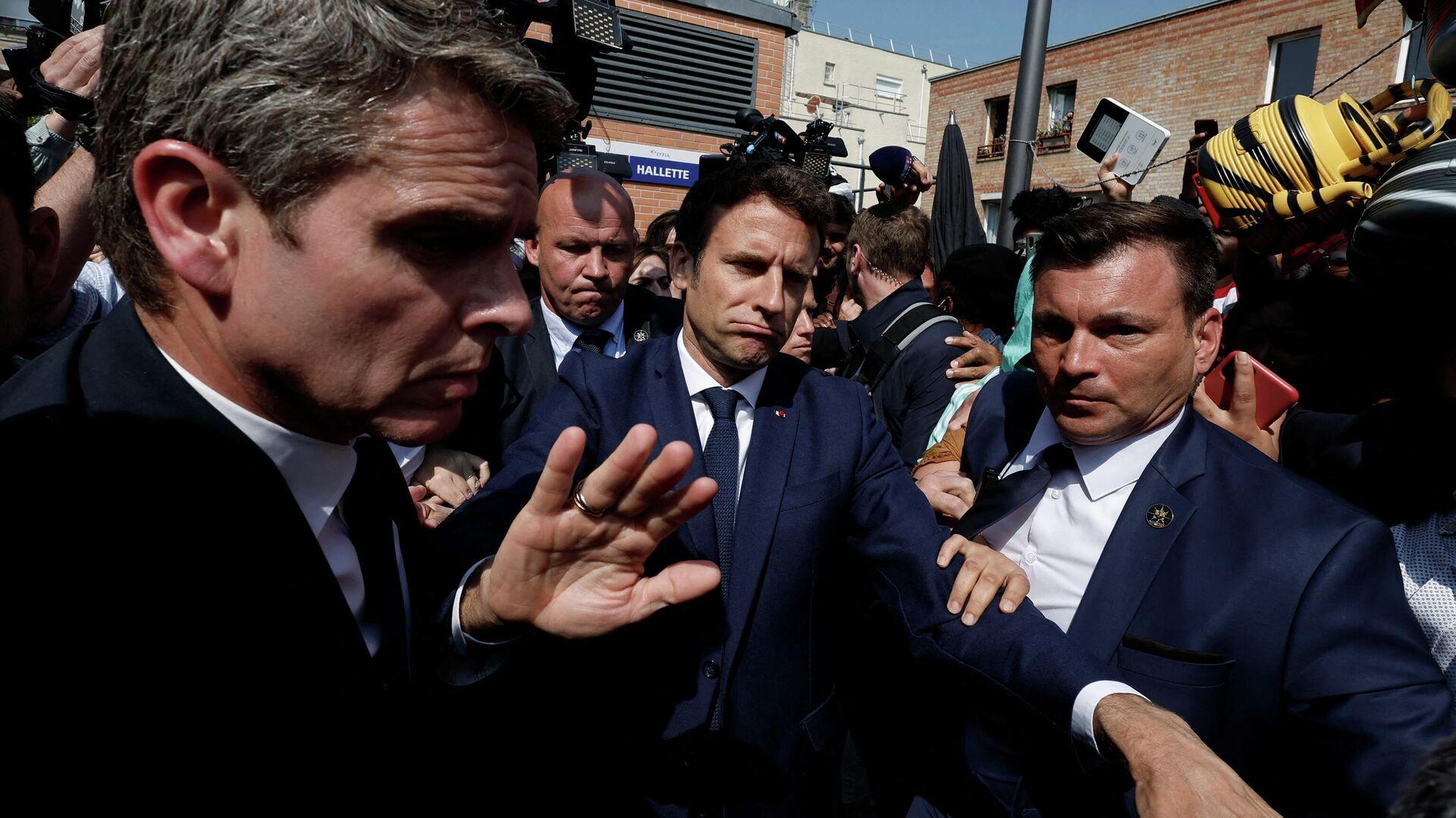Macron's political gambit amidst shifting landscape Rise of European far-right
As observers predicted, last weekend's elections to the European Parliament ended with a resounding victory for right-wing parties. However, nowhere was this triumph more pronounced than in France. Here, supporters of Marine Le Pen's "National Union" received 31.5 percent of the vote.
While this figure aligned with analysts' predictions, few anticipated the extent of the defeat suffered by incumbent President Emmanuel Macron's Renaissance bloc, which secured only 14.7 percent of the vote. This underscored the protest nature of the French voters' decision.
It cannot be said that the pro-presidential bloc had no chance to win. A few months before the elections, the press published a series of articles analyzing the program of the National Union. They emphasized the discrepancies between the rhetoric and deeds of the right. Le Pen's supporters were always talking about the people, while in legislative institutions, for some reason, they always voted in favor of large corporations.
Journalists also questioned the new respectable image of the French right-wing radicals. Many noted that the Rassemblement National (RN) continued to cooperate with extremist and neo-fascist groups. However, the prepared kompromat did not yield results. Besides the righteous denunciation of opponents, Emmanuel Macron's team had nothing to offer but boasts and praise for the "values" of the European Union. In reality, adherence to the EU's stance has pushed French farmers to the brink of ruin, while Macron's economic policies have resulted in a significant increase in national debt and ongoing budget cuts.
The choice of Valérie Pécresse, leader of the Renaissance presidential bloc, was also extremely unsuccessful. She proved incapable of public debate and had to mobilize the newly appointed Prime Minister Gabriel Attal to help her.
Almost immediately after the results were announced, President Macron announced the dissolution of the National Assembly and the preparation of a new electoral campaign.
He said the election was "not a good result for parties that defend Europe.... The far-right parties, which in recent years have opposed so many of the achievements made possible by our Europe, (...) are gaining ground across the continent.... At the end of this day, I could not act as if nothing was happening.... I decided to give you a choice... So tonight I will dissolve the National Assembly ... France needs calm and harmony. To be French is to write history, not to be guided by it."
By doing so, Macron put voters to a choice: maintaining the status quo or a right-wing prime minister.

The dissolution of the assembly would be the first such move since 1997, when then right-wing President Jacques Chirac called snap legislative elections after the left won a majority in them. That forced him to endure five years of "cohabitation," a term used in France when the president and prime minister belong to opposite political camps.
Observers perceived Macron's demarche as an attempt to curb the right-wing opposition, with the expectation that Le Pen's National Rally would not be able to repeat its victory. However, the French right-wing leader was not intimidated by the challenge, saying she could only welcome the calling of new elections and that her bloc was "ready to come to power." Le Pen also said the outcome of the election should be a signal to Brussels and "put an end to the era of globalism."
If Marine Le Pen maintains her party's gains in the June 30 and July 7 snap elections, it gives her a good chance to win the French presidency in the 2027 elections. Many observers fear that the rise to power of a right-wing candidate in the world's seventh economy could shake the structures of the European Union to its foundations.
What Macron and his supporters are hoping for is difficult to understand. At the moment, the most likely outcome of the election is a further reduction of Macron's supporters in Parliament. His party received 5.1 million votes in 2019 and 3.6 million votes in the European Parliament elections. There is no reason to think that anything in this regard will change in the coming days. There is little reason to think that the other center-right party, the Republicans, will go for an alliance with the presidential bloc. Thus, in any outcome, the Macronists' position in the highest legislative body of the country will only weaken.
Not surprisingly, Macron's decision to dissolve the National Assembly was met with disbelief by his supporters. There were cries of "Oh, no!". The mayor of Paris called the dissolution of parliament ahead of the Olympics "an extremely worrying development." At the same time, people supporting Marine Le Pen, upon learning of the upcoming election, started chanting "Dissolution, dissolution!" and cheering. "Is this a shrewd calculation or a mad gamble? There's probably a bit of both here," said Mujtaba Rahman, managing director for Europe at Eurasia Group, a consulting firm. Even if Macron averts the worst-case scenario and Le Pen makes big gains, he could face "an even more unmanageable mess" and "it's still a serious storm" he will have to contend with."
According to Michel Duclos, Special Advisor and Resident Senior Fellow, Geopolitics and Diplomacy at Institut Montaigne think tank, "it is a bit strange that France is now entering a phase of political paralysis, because when elections are taking place, no important decisions can be made, while there are so many important international issues on the agenda".

Meanwhile, Le Monde newspaper says that the decision to dissolve the National Assembly was made long ago and not by Macron himself, but by people behind the French president's back. They include Pierre Charon, the former chairman and CEO of Canal+ TV, a senator and an adviser. Lawyer Bruno Roger-Petit is in charge of media work and acts as an advisor to the election campaigns. Writer Jonathan Gemas is the author of all of Emanuel Macron's campaign speeches.
But the most notable figure is probably Clément Léonarduzzi, the president's c ommunications advisor. The incumbent French president is familiar with him through his participation in the informal political association "Gracchi", which brings together representatives of business, intellectual elite and politics. Macron's contacts with this group are not advertised, but it is known that in 2008, as a banker for the Rothschilds, the future leader of France attended events organized by this organization, trying to keep away from the influence of the press. It is known that Macron and his wife maintain very close contacts with Clément Leonarduzzi.
Russian analyst Olesya Orlenko notes that the plan to dissolve the National Assembly was first raised in November 2022 in connection with the fight to pass pension reform. In April this year, the dissolution of parliament was discussed in connection with the next budget cuts. According to the US-based The Washington Post, Macron can mobilize voters with a "right-wing threat" and "the need to confront Russia". The first slogan does not seem to be working in France anymore, while the second slogan may yield some results.
French policy is feverish today. Politicians are preparing for a new round of political struggle. Both the right and the left are seeking consolidation before the upcoming elections. Marion Maréchal, a member of Eric Zemmour's Reconquête party, which won 5.47 per cent of the vote in the Euro elections, called on her right-wing colleagues from the "Rise France" and "Rassemblement National" to stand united.
The same is being discussed by the leftists from among the supporters of Luc Melanchon’s “Unconquered France", the Communists who have not passed the electoral threshold, the environmentalists and the left-wing socialists who split from Raphaël Glucksmann and Hollande. True, so far all these appeals remain words. In any case, all experts agree that the European far-right in these elections has ceased to be political fringe and has turned into one of the leading forces in European politics.
The views and opinions expressed by guest columnists in their op-eds may differ from and do not necessarily reflect the views of the editorial staff.








